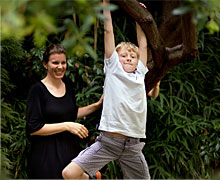Improving Treatment for ADHD
 Dr. Mark Stein’s passion for helping children with attention deficit hyperactivity disorder (ADHD) started three decades ago when, working as a camp counselor, he witnessed how stimulant medications affect kids – for better and for worse.
Dr. Mark Stein’s passion for helping children with attention deficit hyperactivity disorder (ADHD) started three decades ago when, working as a camp counselor, he witnessed how stimulant medications affect kids – for better and for worse.
“When kids started taking these medications, they were suddenly able to play kickball and do all sorts of other activities that they had been too distracted to participate in,” he says. "One child who used to be exuberant and would chase butterflies became much more quiet and had no appetite for lunch. I became interested in how medicines could help but also have negative effects."
Stein, a professor of psychiatry and principal investigator in the Center for Child Health, Behavior and Development, recently joined Seattle Children’s from the University of Illinois at Chicago. He has spent the last 25 years researching ADHD and its treatment. His latest study tackles an intriguing question: Can you improve how kids at risk for ADHD function by treating their mothers first, with either medicine or parent training?
The study, called Mother’s First, builds on the fact that ADHD often runs in families, yet is missed in women. This means that many parents of kids with ADHD might have the condition, leaving them more prone to being distracted or disorganized. Stein thinks that, if you can address these problems in parents, it could make it easier for them to provide the structure and coaching that kids with ADHD need.
For the study, his team is recruiting 46 pairs of mothers and kids who have ADHD symptoms but haven’t been treated with medicine yet. If Stein concludes the mothers have ADHD after an evaluation, they will be treated with either medication; behavioral therapy that trains them to be more organized, develop consistent routines and provide positive feedback to their kids; or the combination of behavioral therapy and medication. The researchers will then evaluate whether this leads to improvements in parenting and delays the need for medication in the child.
If these behaviors get better, treating mothers – who usually take the lead in caring for kids with ADHD – could become a valuable alternative to prescribing stimulants for young children. This is especially important for children under age 6, who often don’t respond well to these medications and experience more side effects than older kids.
“Our goal is to improve the prognosis for young children at risk for ADHD due to genetics and early onset of behavior problems.”
The study fits into Stein’s larger goal of improving ADHD treatment for people of all ages. For instance, he’s investigating whether people with specific gene mutations are more likely to respond well to particular medications. This could lead to genetic tests that help doctors identify the optimal medication for a specific patient.
Stein is also preparing to launch a new ADHD clinic at Seattle Children’s at Overlake. Most children with ADHD have other behavioral, cognitive, medical or family problems and would benefit from a comprehensive evaluation with recommendations for the referring physician, parents, teacher and the school. The clinic will also offer behavioral training to parents and children with ADHD, and potential participation in research studies. ADHD is best treated in the community and not in the office, and it takes a strong team, Stein says.
“We’ll want to help providers and parents sort through this and develop or revise a treatment plan based upon each child’s strengths and weaknesses.”